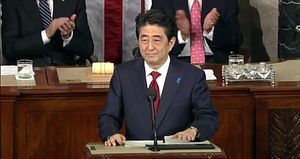2015 – also memorable as the 70th anniversary of Japan’s defeat in WWII – was a busy year for Prime Minister Shinzo Abe and Japan’s political establishment. Highlights include Abe’s state visit to Washington D.C. in late April, the much-anticipated “Abe Statement” regarding World War II on August 15, the passage of controversial security legislation in September, greater cooperation with Southeast Asian partners in light of Chinese activities in the South China Sea, the signing of the Trans-Pacific Partnership (TPP) with the U.S. and ten other Asia-Pacific economies, strengthening ties with India, and progress towards lessening Japan’s isolation in Northeast Asia through a November trilateral meeting with Chinese and South Korean leaders and the eleventh-hour deal to finally resolve the “comfort women” issue with South Korea. Abe also won a predictable but nevertheless important personal victory when he was reelected as president of the ruling Liberal Democratic Party (LDP) in September.
December 2014’s Lower House snap elections, which consolidated the conservative LDP’s hold on power, set the stage for 2015. Abe’s overwhelming victory, despite being marred by record-low voter turnout, meant that he was able to push ahead with his foreign policy and security agenda without having to worry about any opposition party successfully translating citizen discontent into meaningful obstruction. Indeed, the Democratic Party of Japan (DPJ) continued to flounder throughout 2015 despite the election of a new leader, and even the Japan Innovation Party split in such a way as to benefit Abe – the more viable branch, the Osaka Restoration Association, split off so they could more fully cooperate with Abe on constitutional revision.
The most significant development in 2015 was the passage of legislation to implement Japan’s right to collective self-defense and the upgraded U.S.-Japan Defense Guidelines. Unlike any other state in the world, Japan had constitutionally renounced the right to collective self-defense until the Cabinet Legislation Bureau reinterpreted the text in July 2014 to allow for it.
Legally, this is a significant change. It means Japan’s Self-Defense Forces could hypothetically come to the aid of the United States and other partners when they are under attack even if Japan does not face a direct attack. However, debate over how meaningful these changes are will continue for the foreseeable future. The magnitude of these changes will ultimately come down to how strictly the three conditions that must be met for the right to collective self-defense to be exercised will be enforced. These three conditions stipulate that (1) the situation should pose a clear threat to the Japanese state and/or the Japanese people’s right to life and liberty; (2) there is no other response possible; and (3) the use of force is limited to the minimum necessary.
On the one hand, the de jure changes could turn out to be rather insignificant in actual fact in the near future. Because just passing the legislation cost Abe much political support, he will likely tread very carefully in using the legislation unless the situation absolutely requires it. Yet, on the other hand, passing the legislation did matter because it allows Japanese leaders to be better prepared for unpredictable contingencies. They can now plan ahead for how they will respond to “gray zone” situations that could arise anywhere around the world – but particularly in the East China Sea.
Because of Japan’s militarist past, even small changes in Japan’s military posture tend to be imbued with overexaggerated significance – such as the modest increase in Japan’s defense budget. Over the course of 2015, Japan has also sought to expand its defense exports and build its military-industrial base by creating the Acquisition, Technology and Logistics Agency. Other under-the-radar developments are the implementation of Japan’s controversial state secrets law and the establishment of the International Terrorism Intelligence Gathering Unit. Though unpopular in some circles, none of these issues has garnered the same feverish opposition because there is broader consensus that such initiatives are necessary for Japan’s security.
A few significant agenda items left unaccomplished by Abe in 2015 include realizing Russian President Vladimir Putin’s visit to Japan, clinching a deal on submarine technology cooperation with Australia, pacificing Okinawans’ discontent with the plan to relocate U.S. bases, becoming a permanent member of the UN Security Council, playing a proactive role in the international refugee crisis, and resolving the issue of Japanese citizens abducted by North Korea. The most recent test of a nuclear device by the North Korean regime has made the last quandary even more challenging, despite Abe having risen to fame in the early 2000s on this very issue.
So what’s next in 2016?
Abe and the LDP are preparing for Upper House elections, which are slated for this summer. Despite much speculation, Abe has ruled out calling a double election – holding a snap election for the Lower House at the same time as the triennial Upper House elections. In this election, Abe wants to make constitutional revision an issue so that he may fulfill his lifelong dream to amend the foreign-imposed document.
But while a lot of Abe’s campaign rhetoric might emphasize the constitution, most of the actual policies that the Diet will deliver in 2016 will focus on addressing economic challenges (e.g. creating a “dynamic society” and ratifying the TPP) despite opposition parties’ desire to tangle with the Abe government on security legislation again. Work will continue on many of the foreign policy and security advances made in 2015 of course. But these issues will take a backseat to Abe’s need to regain popularity by rebuilding Japan’s economy.

































